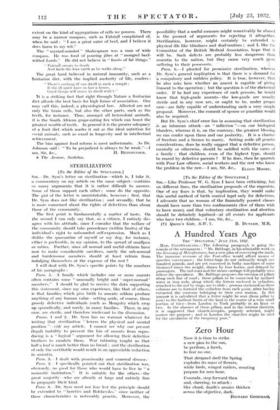STERILIZATION
[To the Editor of the SPECTATOR.] Sin,—Dr. Sym's letter on sterilization—which is, I take it, a commentary on my article on the same subject—contains so many arguments that it is rather difficult to answer. Some of them support each other ; • some do the opposite. The gist of the letter is unmistakable, however : first, that Dr. Sym does not like sterilization ; and secondly, that he is more concerned about the rights of defectives than about those of the community.
The first point is fundamentally a matter of taste. On the second I can only say that, as a citizen, I entirely dis- agree with his attitude, since I consider that the welfare of the community should take precedence (within limits) of the individual's right to unbounded Self-expression.. Much as I dislike the quarantine of myself or my dog, for instance, either is preferable, in my opinion, to the spread of smallpox or rabies. Further, since all normal and useful citizens have now to make considerable sacrifices, surely the sub-normal and burdensome members should at least refrain from indulging themselves at the expense of the rest ?
I will deal with Dr. Sym's specific points by the numbers of his paragraPhS :
Para. 5.—A family which includes one or more aments often contains sonic " unusually bright and super-normal' members." I should be glad to receiw the data supporting this statement, since my own experience, like that of others, is that families which give birth to aments seldom produce anything of any human value—setting aside, of course, those grossly defective individuals (such as Mongols) which crop up sporadically,. and rarely, in many families. These, in any ease, are sterile, and therefore irrelevant to the discussion.
Pants. 1 and 2.—Dr. Sym has no warrant whatever for writing that sterilization ". lowers the physical and mental position "—vide my article. I cannot see why our present (legal) inability to prevent the kin of aments from repro- ducing is a " logical " argument for allowing their defective brothers to emulate them. War rationing taught us that half a loaf is much better than no bread ; and the sterilization of only the certifiable would result in an appreciable reduction
in amentia. •
Para. 3.—I dealt with promiscuity and venereal:. disease:: Para. 2.—I specifically pointed out that sterilization 'was,
obviously, no good for those who would have to live in "a monastic institution." It is suitable for the others—the great majority—who are already at large and entirely free to propagate their kind.
Para. 8.—Dr. Sym need not fear lest the principle should be extended to " heretics and Bolsheviks," since neither of
• these characteristics is noticeably, genetic. Moreover, the
.possibility that a useful measure might conceivably be abused is the poorest of Arguments for rejecting it altogether. Sterilization, however, might certainly be extended to physical ills like blindness and deaf-mutism ; and I, like the Committee of the British Medical Association, hope that it will be. Such defects are probably less dangerous than amentia to the nation, but they cause very much 11,1ore suffering to their possessors. '
Para. 6.-1 pleaded for permissive sterilization, whereas Dr. Sym's general impliceion is that there is a demand for a compulsory and ruthless policy. It is true, however, that be also asks here whether an ament is capable of giving --Consent to the operation ; but the question is of the rhetorical order. If he had any experience of such persons, he wduld know that high-grade aments—the low-grade are usually sterile and in any case are, or ought to be, under proper care—are fully capable of understanding such a very simple proposal. Moreover, the consent of spouse or guardian would also be required.
But Dr. Sym's chief error lies in assuming that sterilization -is an inhuman attack—an "infliction "—on our biological blunders, whereas it is, on the contrary, the greatest blessing we can confer upon them and our posterity. It is a charter of freedom and a licence to marry. Setting aside all genetic considerations, does he really suggest that a defective person, mentally or otherwise, should be saddled with the cares of a family : that children, even of the highest type, should be reared by defective parents ? If he does, then he quarrels with Poor Law officers, social workers and the rest who know the problem in the raw.—I am, Sir, &c., ELDON MOORE.














































 Previous page
Previous page